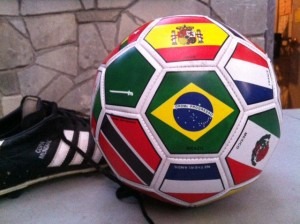As Brazil prepares to host two of the world’s largest sporting extravaganzas, the 2014 World Cup and 2016 Summer Olympics, this summer’s FIFA Confederations Cup has already offered a preview of what we may see over the next few years as the country takes its place in the global spotlight. This summer’s competition, seen as a sort of warm-up for the larger games to come, has offered a great deal of excitement both on and off the pitch. While soccer is already synonymous with Brazil the world over, the host squad has looked very impressive thus far, dominating Japan (3-0) and Mexico (2-0). Brazil has already secured a spot in the semi-finals and Ney mar has shown himself to be a brilliant young talent with some spectacular goals. With all that Brazil has going for it inside the stadium, you may expect that most Brazilians would be contentedly anticipating a record sixth World Cup title next July. However, the atmosphere and attention across the country, where protests have recently been held in more than 100 cities, have proven quite the contrary. The grandiose amounts of money being spent on new and renovated stadiums stand in stark contrast to the proposed hikes in public transportation costs; incompetent handling of the protests have only further galvanized Brazilians.
mar has shown himself to be a brilliant young talent with some spectacular goals. With all that Brazil has going for it inside the stadium, you may expect that most Brazilians would be contentedly anticipating a record sixth World Cup title next July. However, the atmosphere and attention across the country, where protests have recently been held in more than 100 cities, have proven quite the contrary. The grandiose amounts of money being spent on new and renovated stadiums stand in stark contrast to the proposed hikes in public transportation costs; incompetent handling of the protests have only further galvanized Brazilians.
The protestors, now reportedly numbering over 1 million, have adroitly anticipated and taken advantage of the increasing international focus that global sporting events attract. Only time will tell how the twentieth installment of the World Cup will interact with the already agitated political situation in a nation of nearly 200 million people. As politics and sports take center stage in Brazil, I am reminded of the last time the tournament took place in South America: 1978 Argentina.
At the heights of the Dirty War against ‘political dissidents,’ the military dictatorship played host to FIFA’s greatest event. With the world’s eyes and ears set on Argentina, Videla and his junta attempted to co-opt the sporting spectacle to promote their political agenda and redeem the regime’s reputation. The opening images of the film Cautiva review that summer’s tourney, culminating with an Argentine victory over Holland, has become associated with that dark part of the national past. One of the more interesting aspects of this effort was the proliferation of the Fox News-esque “Los argentinos somos derechos y humanos» campaign that inundated the country with stickers bearing this slogan. The Argentine squad won the 1978 World Cup, and it had long been suspected that corruption played a part. Only recently has anyone admitted to fixing the tournament.
It will certainly be interesting to see what happens in Brazil over the next few years, both inside and outside the stadiums…

Un comentario
Thanks for adding to the discussion about how the Olympics and the World Cup have contributed to social unrest, political violence and international politics. Is there any way to have these large world-wide sporting events that deal with SO much money and avoid the violence and political maneuvering?